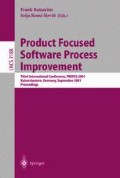Abstract
This paper presents a software engineering process that includes family-based aspects for aero-engine control software. The process uses a “family capability” derived from family analysis of the embedding system. This analysis allows reuse capability to be designed into the process by exploiting prior knowledge of the differences between members of an engine family. The process described follows the traditional software lifecycle. However, the nature of the stages is modified to incorporate the use of the family capability, essentially to allow systematic application of both compositional and generational reuse throughout the development process. The process described was evaluated on a trial project to develop, and subsequently modify, a thrust reverser system for a small aero-engine. Initial results show that this process can reduce effort for both initial and subsequent developments through the use of the family capability.
Acknowledgements
The work described herein would not have been possible without widespread support in York and at Rolls-Royce. In particular we wish to thank Paul Emberson, Andy Galloway, Jamie Hodkinson, Andrew Payne, George Taylor and Eddie Williams. We gratefully acknowledge the financial support from Rolls-Royce and the EPSRC CONVERSE Grant (GR/L42872).
Access this chapter
Tax calculation will be finalised at checkout
Purchases are for personal use only
Preview
Unable to display preview. Download preview PDF.
References
John Barnes. High Integrity Ada The SPARK Approach. Addison-Wesley Longman Ltd, 1997.
Sergey Berezin. The SMV web site. http://www.cs.cmu.edu/~modelcheck/smv.html, 1999. The latest version of SMV and its documentation may be downloaded from this site.
J.-F. Bergeretti and B.A. Carré. Information-Flow and Data-Flow of while-Programs. ACM Transactions on Programming Languages and Systems, 7(1):37–61, January 1985.
Timothy A. Budd. Mutation analysis: Ideas, examples, problems and prospects. Computer Languages Program Testing, 10(1):63–73, 1985.
A. Burns and A.J. Wellings. HRT-HOOD: A structured design method for hard real time systems. Real Time Systems Journal, 6(1):73–114, January 1994.
A. Burns and A.J. Wellings. HRT-HOOD: A Structured Design Method for Hard Real Time Ada Systems. Elsevier, 1995.
Simon Burton, John Clark, and John McDermid. Testing, proof and automation, an integrated approach. In Proceedings of the 1st International Workshop on Automated Program Analysis, Testing and Verification, June 2000.
John Clark and Nigel Tracey. Solving constraints in LAW. LAW/D5.1.1(E), European Commission-DG III Industry, 1997. Legacy Assessment Worbench Feasibility Assessment.
James Coplien, Daniel Hoffmann, and David Weiss. Commonality and variability in software engineering. IEEE Software, pages 37–45, November/December 1998.
R. DeMillo, R. Lipton, and F. Sayward. Hints on test data selection: Help for the practicing programmer. IEEE Computer, 11:34–41, 1978.
Andy Galloway, Trevor Cockram, and John McDermid. Experiences with the application of discrete formal methods to the development of engine control software. Proceedings of DCCS’ 98. IFAC, 1998.
David Harel, Hagi Lachover, Amnon Naamad, Amir Pnueli, Michael Politi, Rivi Sherman, Aharon Shtull-Truaring, and Mark Trakhenbrot. STATEMATE, a working environment for the development of complex reactive systems. IEEE Transactions On Software Engineering, 16:403–414, 1988.
J.V. Hill, J.A. McDermid, R. Rimmer, and B.R. Whittle. Re-use of engine control technology. 1994 Avionics Conference and Exhibition, ERA Technology, 1994.
Mike Mannion, Barry Keepence, Hermann Kaindl, et. al. Reusing Single System Requirements from Application Family Requirements. In Proceedings of the 21st International Conference of Software Engineering, pages 453–463, May 1999.
John McDermid, Andy Galloway, Simon Burton, John Clark, Ian Toyn, Nigel Tracey and Samuel Valentine. Towards industrially applicable formal methods: Three small steps, one giant leap. Proceedings of the International Conference on Formal Engineering Methods, October 1998.
J Neighbors. The Draco Approach to Constructing Software from Reusable Components. IEEE Transactions on Software Engineering, SE-10:564–573, September 1984.
M.A. Ould. Business Processes: Modelling and analysis for re-engineering and improvement. Wiley, 1995.
D.L. Parnas. On the Design and Development of Program Families. IEEE Transactions on Software Engineering, 2(1):1–9, March 1976.
R Prieto-Díaz. Domain Analysis: an Introduction. Software Engineering Notes, 15(2):47–54, April 1990.
L. Sha, R. Rajkumar and J.P. Lehoczky. Priority inheritance protocols: an approach to real-time synchronization. IEEE Transactions on Computers, 9(9):1175-85, September 1990.
H. Simpson. The MASCOT method. Software Engineering Journal, 1(3):103-20, May 1986.
H.R. Simpson. Layered architecture(s): Principles and practice in concurrent distributed systems. In IEEE Symposium on Parallel and Distributed Processing, 1996.
Software Engineering Institute. Model-Based Software Engineering. http://www.sei.cmu.edu/mbse/, 1997.
J.M. Spivey. The Z Notation-A Reference Manual. Prentice-Hall, Second edition, 1992.
Ian Toyn. Formal reasoning in the Z notation using CADiZ. 2nd International Workshop on User Interface Design for Theorem Proving Systems, July 1996.
Ian Toyn. The CADiZ web site. http://www.cs.york.ac.uk/~ian/cadiz/, 1999. The latest version of CADiZ and its documentation may be downloaded from this site.
A. Vickers, P. Tongue and J. Smith. Complexity and its Management in Requirements Engineering. INCOSE UK Annual Symposium-Getting to Grips with Complexity, Coventry, UK, 1996.
A.J. Vickers, J.E. Smith, P.J. Tongue and W. Lam. The ConCERT Approach to Requirements Specification-Version 2.0. Technical Report YUTC/TR/96.1 Rolls-Royce University Technology Centre, University of York, York, UK, YO10 5DD, November 1996.
Author information
Authors and Affiliations
Editor information
Editors and Affiliations
Rights and permissions
Copyright information
© 2001 Springerj-Verlag Berlin Heidelberg
About this paper
Cite this paper
Allenby, K. et al. (2001). A Family-Oriented Software Development Process for Engine Controllers. In: Bomarius, F., Komi-Sirviö, S. (eds) Product Focused Software Process Improvement. PROFES 2001. Lecture Notes in Computer Science, vol 2188. Springer, Berlin, Heidelberg. https://doi.org/10.1007/3-540-44813-6_20
Download citation
DOI: https://doi.org/10.1007/3-540-44813-6_20
Published:
Publisher Name: Springer, Berlin, Heidelberg
Print ISBN: 978-3-540-42571-7
Online ISBN: 978-3-540-44813-6
eBook Packages: Springer Book Archive

